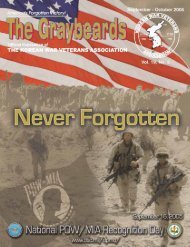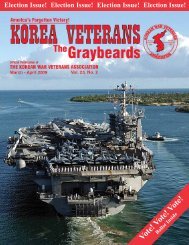The Graybeards - KWVA - Korean War Veterans Association
The Graybeards - KWVA - Korean War Veterans Association
The Graybeards - KWVA - Korean War Veterans Association
Create successful ePaper yourself
Turn your PDF publications into a flip-book with our unique Google optimized e-Paper software.
Part II: Continued from the November-<br />
December, 2000 issue of <strong>The</strong> <strong>Graybeards</strong>.<br />
We now had the post-op cases<br />
lying in more or less orderly<br />
rows on the hillsides all around<br />
the hospital. Some were on stretchers, most<br />
on the ground. <strong>War</strong>d corpsmen walked<br />
along the rows checking dressings, marking<br />
the wounded for evacuation by truck,<br />
jeep, helicopter, or for holding for a doctor<br />
to recheck before evacuation. It was hot,<br />
lying there in the sun, and we had to be<br />
sure the wounded weren’t getting dehydrated.<br />
I asked WOHC George de Preaux<br />
to send a couple of our security Marines<br />
around with jerry cans of water.<br />
Commander Ayres sent up a crew of<br />
Marines from Able Med to put up five 16 x<br />
32 squad tents to use as post-op recovery<br />
wards. I could hear them laughing and talking<br />
and had the urge to run out there and<br />
ask them what was so damn funny and didn’t<br />
they know there was a war on and<br />
would they kindly knock off the noise.<br />
Fortunately I recognized that I was getting<br />
irrational in my fatigue and that those<br />
gyrenes had every right to be happy. Most<br />
if not all of them had been up on the lines<br />
themselves, I was sure, and had earned<br />
their right to a rear-echelon job.<br />
I squeezed my eyes shut for a moment,<br />
clenched my jaws, and kept on cutting. A<br />
couple of hours later I was mighty glad that<br />
I’d controlled my temper because one of<br />
those Marines came to the flap of the Minor<br />
tent and said, “Sir, we got the tents up and<br />
we rolled up the sides and laid out the<br />
stretcher racks and is there anythin’ else we<br />
kin do for ya while we’re up here?”<br />
We emptied out our old wards to take<br />
the newly operated cases. And Ayres, God<br />
bless him, sent two six-by trucks up from<br />
Able and took twenty-five walking wounded<br />
back to have their debridements done<br />
there. I wished I could’ve seen the looks of<br />
horror on the faces of the internists, pediatricians<br />
and other nonsurgical types when<br />
they were called out of their snug bunks to<br />
do surgery!<br />
We were all beginning to show heavy<br />
dark circles under our bloodshot eyes.<br />
Small drops of tears trickled from the inner<br />
comers. <strong>The</strong> supply of surgical caps ran out<br />
so we tied masks onto our foreheads to<br />
keep loose hairs and sweat from dripping<br />
<strong>The</strong><br />
Battle<br />
for<br />
Bunker<br />
Hill<br />
As seen from Easy Med<br />
into the open wounds. Some of the corpsmen<br />
wore their green fatigue hats backwards<br />
like a baseball catcher’s.<br />
It was steamy hot in those tents and<br />
most of us had taken off our fatigue jackets.<br />
One of the corpsmen who was just moving<br />
patients around had taken off his pants, too.<br />
I stopped him dead with, “Three demerits<br />
for being out of uniform, mac!” Startled, he<br />
almost came to attention and then saw the<br />
laughter on my face.<br />
A visitor would have thought it a ludicrous<br />
sight to see doctors and corpsmen<br />
running around the tents in combat boots,<br />
white skivvy shirts, green fatigue pants, and<br />
two masks tied to the front of their heads.<br />
Nobody was laughing.<br />
Those laughing the least were the doctors<br />
and corpsmen in the main operating<br />
tent. <strong>The</strong>ir’s was the toughest job of all. It<br />
By Birney Dibble M.D.<br />
was here that life or death operations were<br />
performed. It was here that legs were saved<br />
or sawed off. Bellies were opened to stem<br />
the flow of blood and liquid feces.<br />
Shattered kidneys and spleens were<br />
removed. Livers were sutured. Chest<br />
drainage tubes were inserted. And through<br />
it all, the principles of good surgery had to<br />
be observed.<br />
Even when sweat pours down your face<br />
and stings your eyes. Even when your<br />
hands tremble with fatigue. Even when<br />
your brain is numb from sleeplessness.<br />
About 1000 on Sunday the 17th, thirtysix<br />
hours since the first copters arrived and<br />
fifty-two hours since anyone had slept, I<br />
took my turn as first assistant in the Major<br />
tent. I worked with Bill Ogle. We made a<br />
good team.<br />
Bill was a good surgeon and I’d done<br />
enough surgery to be a good assistant.<br />
Doctors who don’t ever do surgery make<br />
very poor assistants: they don’t know what<br />
the surgeon is going to do next. A good<br />
assistant anticipates the surgeon’s next<br />
move, keeps him out of trouble when his<br />
intense concentration causes him to overlook<br />
the proximity of another organ, anticipates<br />
the use of special sutures or instruments.<br />
<strong>The</strong> assistant must be all things to<br />
all surgeons and, most importantly, must<br />
keep his hands out of the way yet always<br />
have them in the right place!<br />
Dr. Sam Dougherty sat in the center of<br />
the OR tent between the head ends of two<br />
operating tables. With his left hand he was<br />
giving a general anesthetic to a patient on<br />
one table where Dr. Frank Spencer was<br />
working. With his right hand he arranged<br />
the medicines and instruments for the<br />
induction of the next patient on the other<br />
table. Sam was preoccupied, concentrating<br />
intensely, his mind working on two entirely<br />
separate problems at the same time.<br />
Two corpsmen brought in our next<br />
patient and lifted him gently off the stretcher<br />
onto the table. His battle fatigues had<br />
been replaced by dark blue pajama-like<br />
pants. His torso was pale white, contrasting<br />
with the deep tan of his face and hands —<br />
a farmer’s tan, my Dad would’ve called it.<br />
He was about nineteen, strong of face and<br />
body.<br />
He had two small defects: a tiny hole in<br />
his abdomen just below the ribs on the right<br />
where a bullet had gone in, a slightly larger<br />
Page 16<br />
<strong>The</strong> <strong>Graybeards</strong>

















